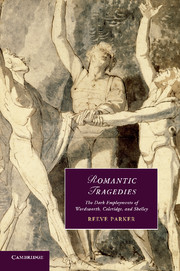Book contents
- Frontmatter
- Contents
- List of illustrations
- Acknowledgments
- Introduction: “Prowling out for dark employments”
- PART I WORDSWORTH
- PART II COLERIDGE AND SHELLEY
- CHAPTER 5 Osorio's dark employments: tricking out Coleridgean tragedy
- CHAPTER 6 Listening to Remorse: assuming man's infirmities
- CHAPTER 7 Reading Shelley's delicacy
- Notes
- Bibliography
- Index
- CAMBRIDGE STUDIES IN ROMANTICISM
CHAPTER 5 - Osorio's dark employments: tricking out Coleridgean tragedy
Published online by Cambridge University Press: 05 May 2014
- Frontmatter
- Contents
- List of illustrations
- Acknowledgments
- Introduction: “Prowling out for dark employments”
- PART I WORDSWORTH
- PART II COLERIDGE AND SHELLEY
- CHAPTER 5 Osorio's dark employments: tricking out Coleridgean tragedy
- CHAPTER 6 Listening to Remorse: assuming man's infirmities
- CHAPTER 7 Reading Shelley's delicacy
- Notes
- Bibliography
- Index
- CAMBRIDGE STUDIES IN ROMANTICISM
Summary
There are sublime gestures that no oratorical eloquence can ever render … The sleepwalking Lady Macbeth … advances in silence and with eyes shut onto the stage, imitating the action of a person who washes her hands, as if hers had been stained with the blood of her king whose throat she had cut more than twenty years before. I know nothing so pathetic in discourse as the silence and the movement of the hands of this woman. What an image of remorse!
(Diderot, Letter on the Deaf and Mute [1751])[A] man who has real power at his command will not avail himself of trick: he will despise it.
(Schiller, The Ghost-Seer or the Apparitionist [c.1786])The remarkable stage success of Coleridge's tragedy Remorse in early 1813 finished off the version called Osorio he had written fifteen years earlier and left its shade to hang in the seldom opened closet much of posterity for so long dismissively marked “Romantic Drama.” That gothic fate was sealed, ironically, by condescension to the very ideologies of stageability that had led Richard Sheridan, owner of Drury Lane, who had invited Coleridge to submit a tragedy, to reject Osorio late in 1797 because of “the obscurity of the last three acts.” This chapter offers Osorio a spectral airing, partly in the hope that it might come to haunt the imaginations of those engaged in efforts to breathe life into Coleridge's frequently overlooked powers as a dramatist and on the role theater might play in times of political conflict and ministerial tyranny.
- Type
- Chapter
- Information
- Romantic TragediesThe Dark Employments of Wordsworth, Coleridge, and Shelley, pp. 109 - 140Publisher: Cambridge University PressPrint publication year: 2011

